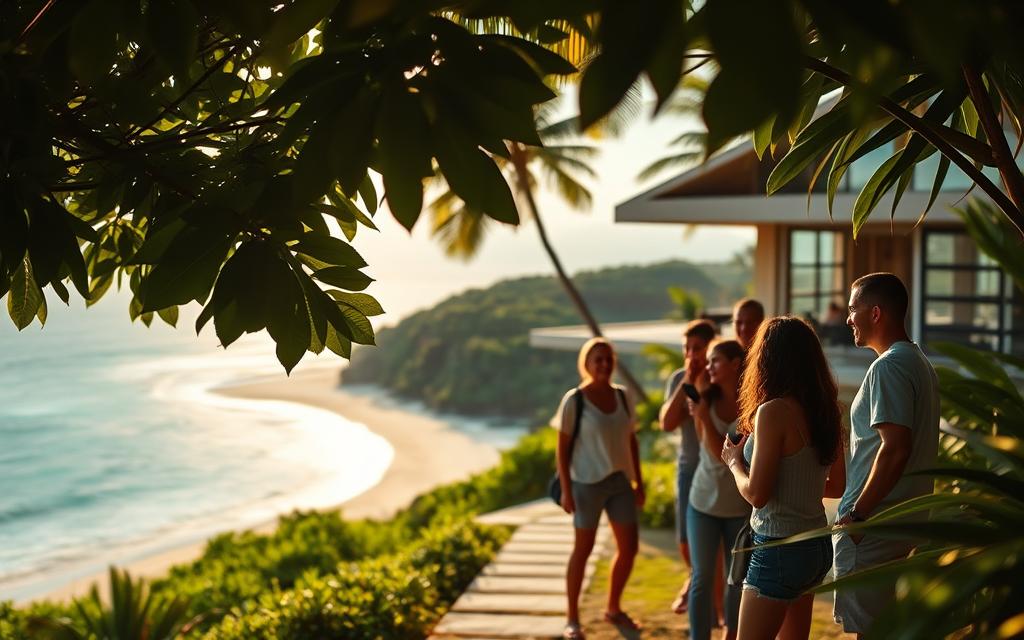The Simplest Way to Obtain Costa Rican Residency

Costa Rica is a top choice for expats seeking a high quality of life. With its stunning natural beauty, mild climate, and welcoming culture, it’s no wonder many choose to call this country home. Whether you’re retiring, investing, or reuniting with family, Costa Rica offers diverse residency options to suit your needs.
Popular pathways include the pensionado, rentista, and inversionista programs. Each has specific requirements, such as proof of income or investment. These programs make it straightforward to secure long-term stays in this vibrant country.
Our guide will walk you through the application process, from gathering documents to overcoming common challenges. Let’s explore how you can start your journey toward Costa Rican residency today.
Introduction to Costa Rican Residency
Costa Rica’s reputation for stability and quality of life attracts expats worldwide. Known for its democratic values and peaceful environment, this Central American country offers a welcoming atmosphere for retirees, investors, and families alike. The ‘pura vida’ lifestyle, emphasizing simplicity and happiness, is a major draw for those seeking a balanced and fulfilling life.
Why Costa Rica is a Top Choice for Expats
Costa Rica stands out for its political stability and commitment to democracy. Unlike many countries, it abolished its military in 1948, redirecting resources toward education and healthcare. This focus has created a high standard of living, making it an ideal destination for expats. Additionally, the country’s diverse expat community ensures a smooth transition for newcomers.
An Overview of the Residency Landscape
Costa Rica offers various residency programs to suit different needs. Temporary options like the pensionado, rentista, and inversionista visas cater to retirees, those with stable income, and investors, respectively. Permanent residency is available after maintaining temporary status for three years. Each program has specific requirements, such as proof of income or investment, making it essential to choose the right path.
Maintaining residency is straightforward, with minimal physical presence requirements. Applicants must provide documents like proof of income, a clean criminal record, and a valid passport. These steps ensure a smooth application process, paving the way for a new life in Costa Rica. In the following sections, we’ll explore these options in greater detail to help you make an informed decision.
Understanding Costa Rica Residency Options
Costa Rica provides diverse residency options tailored to different lifestyles. Whether you’re planning a short-term stay or seeking long-term stability, understanding the differences between temporary and permanent residency is essential. Each option has unique benefits and requirements, making it crucial to choose the right path for your goals.
Temporary vs. Permanent Residencies
Temporary residency is ideal for those testing the waters in Costa Rica. Permits are valid for two years and can be renewed if qualifications are met. This option often serves as a stepping stone toward permanent status, which requires maintaining temporary residency for three years.
Permanent residency offers long-term stability and fewer renewal requirements. Permits need renewal every five years, making it a convenient choice for those committed to staying in the country. Both options require proof of income or investment, ensuring applicants can support themselves financially.
Key Eligibility Factors
To qualify for residency, applicants must meet specific income or investment thresholds. For example, pensionado applicants need a minimum monthly income of $1,000, while rentista applicants must deposit $60,000 in a bank and transfer $2,500 monthly for two years.
Documentation is another critical factor. Applicants must provide a clean criminal record, proof of income, and a valid passport. Legalizing these documents ensures a smooth application process. Understanding these requirements helps applicants prepare effectively and avoid delays.
What’s the easiest way to become a resident of Costa Rica
Securing residency in Costa Rica is simpler than many think. The country offers a clear and efficient process for those looking to establish long-term status. By focusing on the right pathway and meeting essential requirements, applicants can navigate the process with ease.
Essential Requirements and Considerations
The most straightforward route to residency involves meeting specific income or investment criteria. For example, the pensionado program requires proof of $1,000 monthly income, while the rentista program demands $2,500 monthly or a $60,000 deposit. These options cater to retirees and those with stable finances.
Document preparation is another critical step. Applicants must provide a clean criminal record, proof of income, and a valid passport. Legalizing these documents ensures a smooth application process. Hiring expert guidance can also simplify the journey, especially for first-time applicants.
Thorough documentation and a clear understanding of the process significantly reduce processing times. By following a logical sequence—from gathering documents to submitting the application—applicants can achieve residency efficiently. For more detailed insights, visit our guide on how to get residency in Costa.
Exploring Rentista, Investment, and Pensionado Paths
Costa Rica offers distinct residency pathways tailored to diverse financial profiles. Whether you’re a retiree, investor, or someone with a steady income, there’s a program designed to meet your needs. Let’s explore the Rentista, Investor, and Pensionado options to help you choose the best fit.
Insights into Rentista Residency
The Rentista program is ideal for individuals with a stable income. Applicants must demonstrate a monthly income of $2,500 for at least two years. Alternatively, a $60,000 deposit in a Costa Rican bank can fulfill this requirement. This option suits those who don’t qualify for retirement benefits but have reliable earnings.
Documentation is key for Rentista applicants. Proof of income, bank statements, and a clean criminal record are essential. Ensuring these documents are properly legalized streamlines the application process.
Investor and Pensionado Alternatives
For investors, Costa Rica’s Inversionista program requires a minimum investment of $150,000 in local projects or property. This pathway is perfect for those looking to contribute to the country’s economy while securing residency.
The Pensionado program caters to retirees with a lifetime pension income of at least $1,000 per month. This option is popular among expats seeking a relaxed lifestyle in Costa Rica. Both programs require precise documentation, including proof of income or investment.
Comparing these options helps identify the best pathway for your financial situation and family needs. Each program offers unique benefits, making Costa Rica an attractive destination for long-term residency.
Step-by-Step Guide to the Application Process
Navigating the Costa Rican residency application process can seem daunting, but with the right steps, it’s manageable. Whether you’re applying for a provisional visa or preparing documents, understanding the sequence is key. This guide breaks down the process into clear, actionable steps.
Obtaining a Provisional Visa
The first step is applying for a provisional visa at a Costa Rican consulate before arrival. This visa allows you to enter the country while your residency application is processed. Required documents include an application letter, birth certificate, police clearance, and passport copies.
Ensure all documents are translated into Spanish and legalized through apostille or consular authentication. Fees vary depending on the consulate, so check the specific requirements for your location. This step ensures a smooth transition into the next phase of the process.
Preparing and Legalizing Documents
Proper document preparation is critical for a successful application. Start by gathering essential paperwork, such as proof of income, a clean criminal record, and a valid passport. All documents must be translated into Spanish and legalized to meet Costa Rican immigration standards.
Once in Costa Rica, complete fingerprint registration at the immigration office. Submit your application along with the legalized documents. Follow up with local authorities to track progress and address any issues promptly. This attention to detail ensures a seamless experience.
By following these steps, you can navigate the Costa Rican residency process with confidence. Proper preparation and understanding of requirements make all the difference in achieving your goal.
Navigating Common Challenges and Requirements
Applying for residency in Costa Rica comes with its own set of challenges, particularly around financial requirements. Many applicants find it difficult to meet the rigorous income and investment thresholds. Understanding these hurdles and preparing effectively can make the process smoother.
Meeting Income and Investment Criteria
One of the most common obstacles is proving a consistent monthly income. For example, the Rentista program requires $2,500 per month for two years or a $60,000 deposit. Similarly, the Pensionado program demands proof of at least $1,000 monthly income. These thresholds ensure applicants can support themselves financially.
Documentation is another critical aspect. All financial records must be translated into Spanish and legalized. This step can be time-consuming but is essential for a successful application. Detailed bank statements, proof of income, and investment records are typically required.
Navigating bureaucratic hurdles can also be challenging. Hiring local experts or legal counsel can simplify the process. They understand the nuances of Costa Rican immigration laws and can help avoid common pitfalls. Verifying the most current requirements with official sources is also crucial, as regulations may change.
By addressing these challenges early, applicants can increase their chances of success. Proper preparation and expert guidance are key to overcoming the financial and bureaucratic obstacles in the Costa Rica residency process.
Embracing the Costa Rican Lifestyle
Living in Costa Rica offers a unique blend of natural beauty, cultural richness, and a relaxed lifestyle. Known for its “pura vida” philosophy, the country emphasizes simplicity, happiness, and community. For families and individuals, residency here opens the door to a fulfilling and balanced way of life.
Benefits for Families and Individuals
Costa Rica is a haven for families, offering quality education and healthcare services. The country’s literacy rate is nearly 98%, and its public healthcare system is accessible to residents. Families can enjoy a safe environment with a strong sense of community.
For individuals, the lower cost of living is a major draw. Monthly expenses are affordable, allowing residents to enjoy a high quality of life without financial strain. Whether it’s exploring national parks or relaxing on pristine beaches, there’s always something to do.
The country’s excellent transportation network makes travel easy. From bustling cities to serene rural areas, Costa Rica’s diverse landscapes are always within reach. This connectivity enhances the overall experience of living here.
By embracing the local lifestyle, residents become part of a welcoming and inclusive community. The “pura vida” culture fosters genuine connections and a sense of wellbeing. For more insights into the benefits of residency, visit our guide on Costa Rican residency benefits.
Expert Tips and Success Stories
Navigating the Costa Rican residency process can be smoother with expert advice and real-life success stories. Relocation specialists have helped countless families and individuals settle in this beautiful country. Their insights can make the journey easier and more efficient.
One key tip is to start the application process early. Gathering documents like proof of income and criminal records takes time. Legalizing these documents through apostille or consular authentication is also crucial. Proper preparation ensures fewer delays.
Advice from Relocation Specialists
Seasoned experts recommend consulting with local legal advisors. They stay updated on the latest immigration laws and can provide tailored guidance. For example, they can help applicants choose the right residency program based on their financial situation and goals.
Another tip is to maintain clear communication with immigration authorities. Following up on application status and addressing issues promptly can speed up the process. Many successful applicants credit their approval to this proactive approach.
Success stories often highlight the importance of expert support. One family shared how their relocation specialist streamlined their application, helping them secure residency within months. These real-life examples inspire confidence in future applicants.
By following expert advice and learning from others’ experiences, you can navigate the Costa Rican residency process with ease. Proper preparation and professional guidance are key to achieving your goal.
Conclusion
Securing Costa Rican residency opens doors to a vibrant lifestyle in a country known for its natural beauty and welcoming culture. Whether through the Pensionado, Rentista, or Inversionista programs, the process is designed to be straightforward with proper preparation. Gathering and legalizing documents like proof of income and criminal records ensures a smooth application journey.
Living in Costa Rica offers numerous benefits, including political stability, affordable healthcare, and a strong sense of community. The “pura vida” philosophy fosters happiness and simplicity, making it an ideal destination for families and individuals alike. With expert guidance, navigating the residency process becomes even more manageable.
Take the next step toward your new life in Costa Rica. For personalized assistance, reach out to legal experts who can simplify the process. Explore the opportunities this beautiful country has to offer and start your journey today.
Article by Jonnathan Morales
Start Today!
Call or WhatsApp (+506) 7182-8969
https://www.jaroscr.com/


